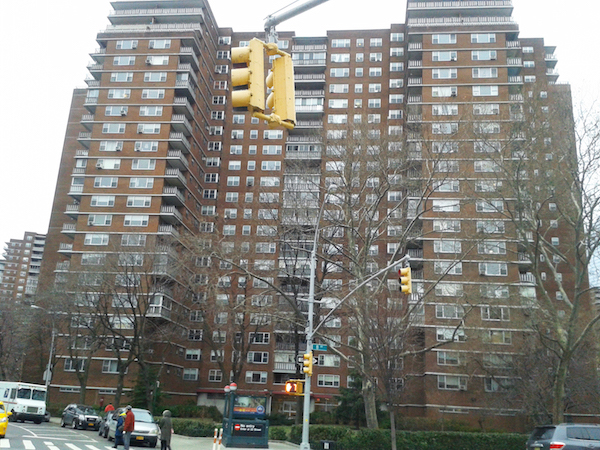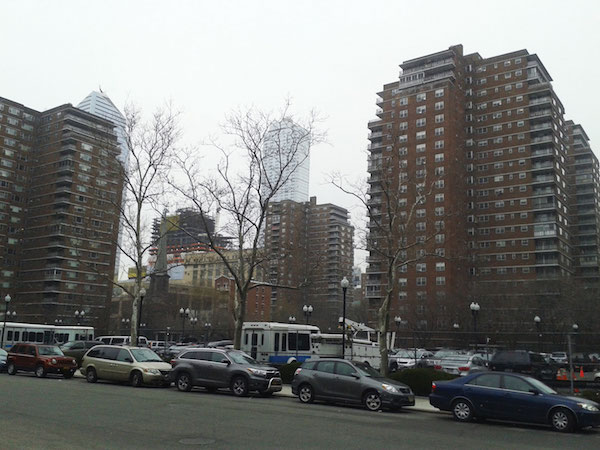
BY DENNIS LYNCH | Chelsea’s long-affordable co-op Penn South complex has closed a deal with the federal government to refinance mortgage loans that could save its nearly 6,000 residents around $3 million per year. Some were worried the deal would grind to a full halt under President-elect Donald Trump’s administration, and made a push for the Obama administration to hasten the process during its waning days.
Senator Chuck Schumer wrote a letter last week to the presidential Office of Management and Budget (OMB) to “swiftly review and make the decisions necessary” to approve the deal. Schumer announced on Wed., Jan. 18, that both OMB and the Department of Housing and Urban Development (HUD) had signed off on the deal.
Schumer wrote in his letter last week for a “sense of urgency” in closing out the deal. A source close to the deal said it would be easier to complete now than under President-elect Donald Trump’s administration. Schumer called Penn South “a special place and a vital part of what makes Manhattan so wonderful.”
“In the bottom of the ninth inning of the Obama administration, I am proud to report that the feds have hit a homerun that will keep Penn South an affordable oasis for current residents and future generations,” Schumer said following the approval of the deal. “Now that this refinancing agreement has been approved by OMB, and finalized by HUD, we can rest assured this development will remain affordable for many more years.”
Penn South’s general manager was himself concerned about the incoming administration — he sensed that presumed HUD Secretary Ben Carson would be less friendly to the type of deal they sought than President Barack Obama’s administration.
“We’re very nervous about the change of administrations, we have lots of reasons to be concerned if it doesn’t get approved before Carson takes over HUD,” Brendan Keany said before the deal was approved.

The deal is to refinance Penn South’s loans for $190 million and would lock in an interest rate for the length of the 35-year mortgage to shield Penn South from future rises in rates. The loan will still come from a private lender, but HUD would guarantee the loan. If Penn South locks in at current interest rates, management estimates it could save $3 million per year that it wouldn’t have to pay toward loan interest, and could be put toward capital improvements at the 15-building, 2,820-unit complex.
Keany said it would be a “hardship” for Penn South and its residents if the federal loan deal had failed.
“We would have to figure out other ways to pay for capital projects, and let’s assume interest rates for mortgages are six, eight, or 10 percent in 2021 — we would be talking significantly higher carrying charges to individuals to pay the interest rates on top of the money for capital improvements.”
Residents would finance those costs, making the affordable co-op affordable no more.
“It’ll climb and climb and climb to maintain the quality of life and maintenance of the physical buildings,” said Gloria Sukenick, a 20-year Penn South resident and longtime Chelsea activist.
“It’s an important piece for the future of the city. We’ve been a prime example of how affordable housing can exist in the city; it’s been very well managed and I can’t think of a better place I’d want to live,” she added.
It’s the first time Penn South has sought such a loan from HUD, which only recently became available. HUD negotiated the first loan of its type with Co-op City in the Bronx in 2012. Penn South’s deal would largely be the same.

Penn South was completed in 1962, and was partly financed by pension investments from the International Ladies Garment Workers Union. It has remained affordable with the help of city tax abatements and city, state, and federal funding.
In co-op housing, residents own a share of the corporation that legally owns the building or complex, and pay towards the mortgage and interest payments, along with maintenance. They vote on corporation decisions.
For much of its existence, prospective residents would put their names on a waiting list for an apartment at Penn South, but now there is a random lottery system, so anyone on the list could potentially get an apartment there regardless of the time they signed up. Sukenick, who waited for 16 years on the list before she secured an apartment, said she hoped the lottery system would bring in younger people and families into Penn South and maintain the vibrant community there in future generations.
Keany was optimistic about the deal, but said there’s still the matter of fine print. “Of course it’s a sigh of relief,” he told Chelsea Now on Jan. 18. “We’re very excited and of course we’re hoping we can do this deal.” He noted with caution, however, “The devil is often in the details. They’ve sent us the commitment agreement it’s a 90-page document, so we’ll have to make our way through it and make sure there’s no impediments we can’t comply with in there.”
Based on early reviews, however, Keany calls the deal a very positive thing for the housing development,” adding, “Once you get the commitment and review it and sign it and send it back, you can move forward to rate lock on the interest rate. At that point they usually have a buyer for the loan. We’re hoping its the AFL/CIO [American Federation of Labor and Congress of Industrial Organizations]. They were the ones who gave us our last mortgage.” Until then, he said, “We’ll just have to wait and see.”

































